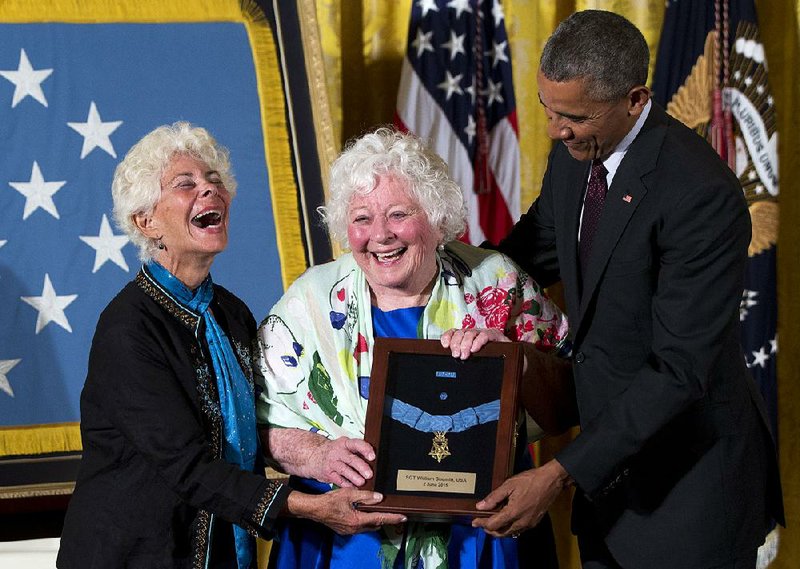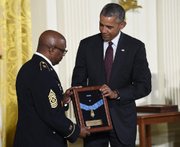WASHNIGTON -- President Barack Obama awarded two World War I soldiers the Medal of Honor on Tuesday, honoring men whose bravery on the battlefields of France had not been recognized with the nation's highest valor award for 97 years because of racial and religious bias.
Sgt. Henry Johnson, a legend in the Army's all-black "Harlem Hellfighters," and Sgt. William Shemin, the Jewish son of Russian immigrants, were acclaimed before a packed East Room of the White House. Neither man had previously been given a shot at the Medal of Honor because of prejudice, the president said.
Obama said there are surely others like them who have gone "unacknowledged and uncelebrated," and that the United States has more work to do to honor them.
"America is the country we are today because of people like Henry and William -- Americans who signed up to serve and rose to meet their responsibilities and then went beyond," the president said. "The least we can do is to say: 'We know who you are. We know what you did for us. We are forever grateful.'"
Johnson, then a private, is credited with fighting off a large group of German raiders in France's Argonne Forest while serving as a sentry. Black soldiers were not allowed at the time to serve in American combat units, but the Hellfighters, the 369th Infantry Regiment, had been sent by Gen. John Pershing to fight alongside undermanned French units.
Early on the morning of May 15, 1918, there was a surprise attack by at least 12 German troops. They opened fire on Johnson and Pvt. Needham Roberts, his fellow sentry, wounding both. The Germans then began to carry away the injured Roberts until Johnson reacted with speed and ferocity.
"Henry refused to let them take his brother in arms," Obama said. "He shoved another magazine into his rifle. It jammed. He turned the gun around and swung it at one of the enemy, knocking him down. Then he grabbed the only weapon he had left -- his bolo knife -- and went to rescue Needham. Henry took down one enemy soldier, then the other. The soldier he'd knocked down with his rifle recovered, and Henry was wounded again. But armed with just his knife, Henry took him down, too."
Accounts of Johnson's bravery by his fellow soldiers -- including Pershing and Roberts -- were found in the past few years by staff members of Sen. Charles Schumer, D.-N.Y. The Army posthumously awarded the Distinguished Service Cross, second only to the Medal of Honor, to Johnson in 2003, but the higher award had been out of reach.
Johnson's Medal of Honor was accepted Tuesday by Command Sgt. Maj. Louis Wilson, the senior enlisted soldier in the New York National Guard.
Johnson died in 1929, without receiving even a Purple Heart. The French, on the other hand, awarded him and Roberts the Croix de Guerre, the country's top award for valor.
Shemin, the other recipient, joined the Army as a teenager by lying about his age, and is credited with braving enemy fire three times in a bloody engagement with German soldiers in France on Aug. 7, 1918. The opposing forces faced off from two trenches about 150 yards apart. The Americans watched as every comrade who dared to rush the enemy position was cut down.
"William Shemin couldn't stand to watch," Obama said. "He ran out into the hell of no man's land and dragged a wounded comrade to safety. Then he did it again, and again. Three times he raced through heavy machine gunfire. Three times he carried his fellow soldiers to safety."
The battle stretched for days, and Shemin, an enlisted soldier, took command after numerous officers became casualties, the president recalled. Shemin was eventually wounded, but recovered.
"Every time there was a lull in combat, he led rescues of the wounded," Obama said. "As a lieutenant later described it, William was 'cool, calm, intelligent, and personally utterly fearless.' That young kid who lied about his age grew up fast in war."
A large contingent from the Shemin family was present at the ceremony, and the award was accepted by two of his daughters, Elsie Shemin-Roth and Ina Bass -- "86 and 83, and gorgeous," the president said.
Shemin-Roth is credited with pushing her father's case forward, and enlisted the help of Missouri's congressional delegation. Shemin, who had three children, died in 1973.
Obama said it takes the United States too long sometimes to recognize heroism and noted that Shemin "served at a time when the contributions and heroism of Jewish Americans in uniform were too often overlooked."
Retired Col. Erwin Burtnick, a historian who helped with the case, said the amount of documentation that Shemin's family members kept about his service helped make their case. Among the new documents the military reviewed was a letter from Shemin's company commander describing his actions on the battlefield.
"We are a nation -- a people -- who remember our heroes," Obama said. "We take seriously our responsibility to only send them when war is necessary. We strive to care for them and their families when they come home. We never forget their sacrifice. And we believe that it's never too late to say thank you. That's why we're here this morning."
A Section on 06/03/2015

